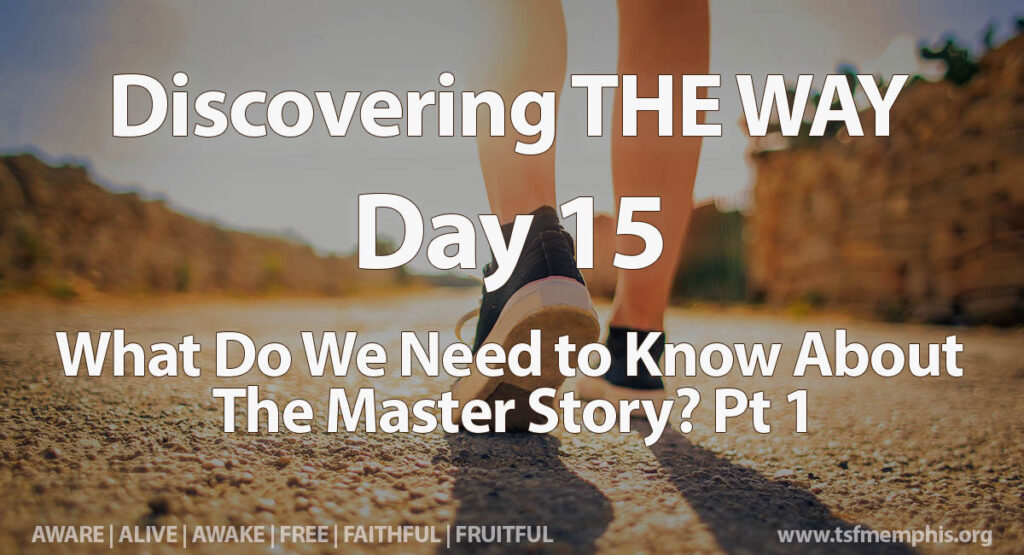Day 015: What Do We Need to Know About the Master Story? PT 1

Life comes to us as a Story; it has a beginning, middle, and an end. We need a larger story, a Master Story, in order to answer the foundational questions about life.
2 Timothy 3:14–15
…continue in what you have learned and firmly believed. You know those who taught you, and you know that from childhood you have known the Sacred Scriptures, which are able to give you wisdom for salvation through faith in Christ Jesus.
Everyone has a worldview that directs the way they think about the World and their place in it. A worldview is a core part of our thinking process as humans so it is important that we understand what it is and how it works. Take a look at the following definition:
Worldview:
A way of seeing the world that is developed
from the core commitment (at heart level)
to a way of worship that is guided by
a set of ideas and beliefs
most often set in the form of a Master Story,
which directs the way we understand reality
and live our lives together with others.
There are Different Master Stories and they are in competition.
There are many different Master Stories in the world. Because they give different answers to the Three Foundational Questions, these stories are often in conflict with one another. In the Acts 17 passage we worked through yesterday, five different people groups were mentioned and they all had different ways of looking at the world.
The Jews are the descendants of Abraham, Isaac, and Jacob who followed the teachings of Moses received directly from the Lord-God. They believed there was only One God and that He has revealed Himself uniquely to the Jewish people. God-fearing Gentiles were not Jewish by birth but were interested in following the teachings of Judaism. We can assume that the Greeks “who happened to be there” in the marketplace were polytheistic—they believed in many gods. As the context makes clear, Athens was filled with temples to the multitude of Greek gods. The Epicureans were philosophers who sought a life of virtue, tranquility, and modest pleasure through simplicity. They were “practical atheists” because they believed that the gods did not intervene in everyday life. Finally, we have the Stoics who believed that personal well-being was achieved through self-sufficiency pursued in virtue, reason, and “natural law.” This was all done free from the influence of “passions.” They were pantheists who believed that “god” was in everything (they called “god” the “world-soul”). They were at odds with the Epicureans.
Each of these views is in conflict with the others in the way they answer key worldview questions: Is there only One God as the Jews affirmed? or are there many gods? Both views can’t be right.
Take a minute to think about our culture now. How is our culture similar to that of Athens in Paul’s time? How many different worldviews do you think exist in our time?
The Master Story of the Bible challenges all other master stories.
Paul was living in very different Master Story than the people he encountered in Athens. Paul believed that the True Story of Life had been revealed to him in Jesus Christ. In this episode, Paul takes this opportunity to show how his Master Story challenged the others.
Using a “hook” from his time in Athens—the altar to the “unknown god”—Paul sees a way to connect with the Athenians. He begins by getting his audience’s attention by praising them for being very religious. Paul starts with what he and his audience share in common—the pursuit to understand reality. At the core of every religion, philosophy, and worldview is the desire to understand reality. As he begins, Paul essentially says, “I am going to tell you about what you are ‘worshipping’ without knowing.”
The Master Story answers the question of our common Origin.
Paul describes God as the Creator of the World and everything in it. Not only is He the Creator, He is also the LORD—sovereign ruler—of both Heaven and Earth. Paul refers to God as THE God. There is only One in Paul’s worldview. This view would be acceptable to the Jews and the God-fearing Gentiles, but would have been repulsive and offensive to the philosophers and Greeks. Notice how they respond to Paul in this passage: he is a “babbler,” speaking nonsense. In the context of this passage, we see that the Athenians thought that Paul was speaking about “foreign gods” because Paul was talking about Jesus and his resurrection from the dead (Acts 17:17-18). Jesus was not part of their traditional and popular religion and mythology.
Paul also reveals in 17:26 that all humanity has its origin in one man. From this one man, all the nations, and tribes, and cultures of humanity came about. We are all sons and daughters of this one man. We are united as the human race because we all come from the same original parents.
This “one man” is Adam (from the Hebrew word adam which means “man”) in Genesis, the first book of the Bible. He and his wife Eve were blessed by God and charged with filling the Earth with other humans. We all descend from them. This idea would have been just as foolish and offensive to the Athenians as it is to many today. The Athenians took great pride in the belief that they all originated from the soil of their homeland. Paul challenges this idea.
What three key ideas did you learn about Master Stories in this reading? List them out and think about the significance of each.
*You can find a complete list of all the MilktoMeat readings here.
